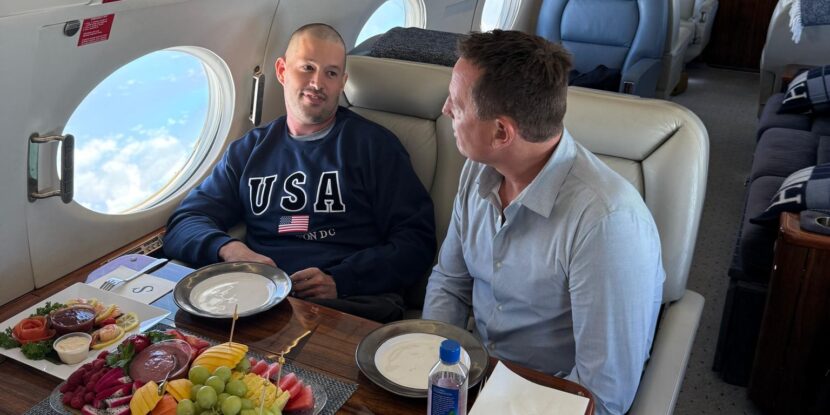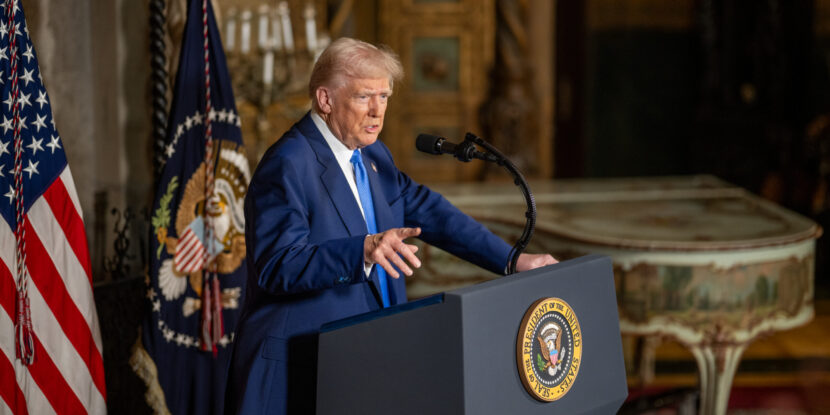
PULSE POINTS:
❓What Happened: A U.S. Air Force veteran detained in Venezuela since November has been released.
👥 Who’s Involved: Joseph St. Clair, his parents Scott and Patti St. Clair, former Trump envoy Richard Grenell, and Venezuelan officials.
Your free, daily feed from The National Pulse.
📍 Where & When: St. Clair was handed over during a diplomatic handoff on Tuesday in a neutral location.
💬 Key Quote: “This news came suddenly, and we are still processing it, but we are overwhelmed with joy and gratitude,” said St. Clair’s parents.
⚠️ Impact: St. Clair’s release is part of ongoing diplomatic efforts that have freed multiple Americans detained abroad.
IN FULL:
A U.S. Air Force veteran detained in Venezuela for nearly a year has been freed, according to his family and U.S. officials. Joseph St. Clair, a decorated language specialist who served four tours in Afghanistan, was handed over to former Trump administration envoy Richard Grenell during a diplomatic exchange on Tuesday.
“Joe St. Clair is back in America,” Grenell confirmed in a post on X (formerly Twitter). “I met Venezuelan officials in a neutral country today to negotiate an America First strategy,” he continued, adding that this was “only possible because [Donald Trump] puts Americans first.”
St. Clair’s parents, Scott and Patti St. Clair, expressed their relief in a statement: “This news came suddenly, and we are still processing it, but we are overwhelmed with joy and gratitude.”
The veteran had traveled to South America seeking treatment for post-traumatic stress disorder (PTSD) when Venezuelan authorities detained him in November. No public charges were ever announced against him, according to his father’s prior comments to the press.
This release follows a series of quiet diplomatic negotiations involving Grenell, including the freeing of six other Americans detained by Venezuela’s government after its controversial presidential election in July. Grenell had previously met with Venezuelan President Nicolás Maduro in Caracas earlier this year, urging the return of Venezuelan nationals in the U.S. who had committed crimes. Hundreds of deportations have since occurred.
Maduro later thanked Grenell and President Donald J. Trump for facilitating the return of a young Venezuelan girl separated from her mother, calling it a “profoundly humane” act.
St. Clair’s safe return adds to a growing list of Americans released from foreign detention through focused diplomatic efforts.

PULSE POINTS:
❓What Happened: The Trump administration sanctioned two top members of Cartel del Noreste, a violent Mexican drug cartel and U.S.-designated foreign terrorist organization.
👥 Who’s Involved: Miguel Angel de Anda Ledzema and Ricardo Gonzalez Sauceda, leaders of Cartel del Noreste; U.S. Treasury Department; Office of Foreign Assets Control (OFAC); Homeland Security Investigations (HSI); Bureau of Alcohol, Tobacco, Firearms and Explosives (ATF); Drug Enforcement Administration (DEA); Mexico’s Financial Intelligence Unit.
Your free, daily feed from The National Pulse.
📍 Where & When: Sanctions announced Wednesday; Cartel del Noreste operates near the Laredo, Texas border region.
💬 Key Quote: “We will continue to cut off the cartels’ ability to obtain the drugs, money, and guns that enable their violent activities,” Treasury Secretary Scott Bessent said.
⚠️ Impact: The sanctions aim to disrupt Cartel del Noreste’s operations, including drug trafficking, arms procurement, and violence on both sides of the U.S.-Mexico border.
IN FULL:
The Trump administration has imposed sanctions on two senior leaders of the Cartel del Noreste, a violent Mexican drug cartel and designated foreign terrorist organization, according to an announcement from the U.S. Treasury Department on Wednesday.
The Office of Foreign Assets Control (OFAC) targeted Miguel Angel de Anda Ledzema and Ricardo Gonzalez Sauceda for their roles in facilitating the cartel’s operations. Officials say the group exerts significant control over the border area near Laredo, Texas.
Ledzema, a high-ranking cartel member, was identified as overseeing the acquisition and trafficking of firearms into Mexico. According to the Treasury Department, he coordinated payments to U.S.-based straw purchasers who misrepresented themselves to obtain weapons, later smuggling them into Nuevo Laredo. One such weapon was reportedly recovered after a March 2024 cartel attack on the Mexican military.
Sauceda, previously second-in-command of the cartel, was arrested in February by Mexican authorities. He allegedly led an armed enforcement unit and was linked to violent assaults on Mexican military and police forces. At the time of his arrest, he was found with firearms, methamphetamine, and fentanyl pills.
Treasury Secretary Scott Bessent emphasized the administration’s commitment to confronting the cartel threat, stating, “We will continue to cut off the cartels’ ability to obtain the drugs, money, and guns that enable their violent activities.” Bessent also highlighted the cartel’s role in campaigns of violence, intimidation, and terrorism that endanger communities on both sides of the border.
The sanctions were coordinated with Homeland Security Investigations, the Bureau of Alcohol, Tobacco, Firearms and Explosives, the Drug Enforcement Administration, and Mexico’s Financial Intelligence Unit.
Paul Perez, President of the National Border Patrol Council, praised the administration’s actions, saying they fulfill President Donald J. Trump’s promise to prevent cartels from operating with impunity. “These actions deal a significant blow and send the message to all cartels that President Trump will follow through,” Perez stated.
show less

 1 month ago
2
1 month ago
2








 English (US) ·
English (US) ·